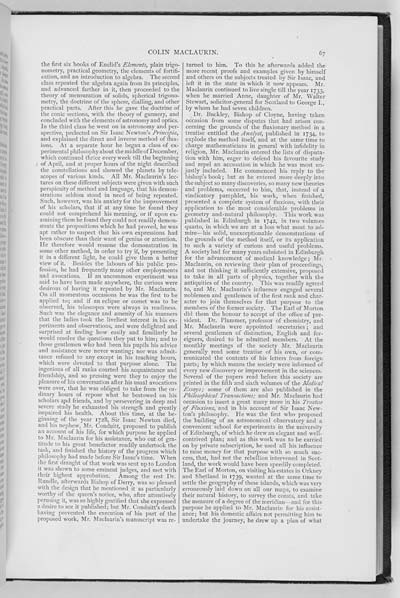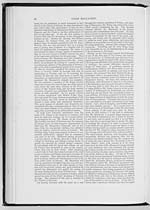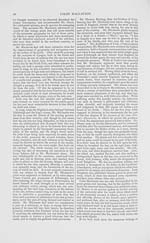67
the first six books of Euclid's Elements, plain trigo-
nometry, practical geometry, the elements of fortifi-
cation, and an introduction to algebra. The second
class repeated the algebra again from its principles,
and advanced farther in it, then proceeded to the
theory of mensuration of solids, spherical trigono-
metry, the doctrine of the sphere, dialling, and other
practical parts. After this he gave the doctrine of
the conic sections, with the theory of gunnery, and
concluded with the elements of astronomy and optics.
In the third class he went on in astronomy and per-
spective, prelected on Sir Isaac Newton's Principia,
and explained the direct and inverse method of flux-
ions. At a separate hour he began a class of ex-
perimental philosophy about the middle of December,
which continued thrice every week till the beginning
of April, and at proper hours of the night described
the constellations and showed the planets by tele-
scopes of various kinds. All Mr. Maclaurin's lec-
tures on these different subjects were given with such
perspicuity of method and language, that his demon-
strations seldom stood in need of being repeated.
Such, however, was his anxiety for the improvement
of his scholars, that if at any time he found they
could not comprehend his meaning, or if upon ex-
amining them he found they could not readily demon-
strate the propositions which he had proved, he was
apt rather to suspect that his own expressions had
been obscure than their want of genius or attention.
He therefore would resume the demonstration in
some other method, in order to try if, by presenting
it in a different light, he could give them a better
view of it. Besides the labours of his public pro-
fession, he had frequently many other employments
and avocations. If an uncommon experiment was
said to have been made anywhere, the curious were
desirous of having it repeated by Mr. Maclaurin.
On all momentous occasions he was the first to be
applied to; and if an eclipse or comet was to be
observed, his telescopes were always in readiness.
Such was the elegance and amenity of his manners
that the ladies took the liveliest interest in his ex-
periments and observations, and were delighted and
surprised at finding how easily and familiarly he
would resolve the questions they put to him; and to
those gentlemen who had been his pupils his advice
and assistance were never wanting; nor was admit-
tance refused to any except in his teaching hours,
which were devoted to that purpose alone. The
ingenious of all ranks courted his acquaintance and
friendship, and so pressing were they to enjoy the
pleasure of his conversation after his usual avocations
were over, that he was obliged to take from the or-
dinary hours of repose what he bestowed on his
scholars and friends, and by persevering in deep and
severe study he exhausted his strength and greatly
impaired his health. About this time, at the be-
ginning of the year 1728, Sir Isaac Newton died,
and his nephew, Mr. Conduitt, proposed to publish
an account of his life, for which purpose he applied
to Mr. Maclaurin for his assistance, who out of gra-
titude to his great benefactor readily undertook the
task, and finished the history of the progress which
philosophy had made before Sir Isaac's time. When
the first draught of that work was sent up to London
it was shown to some eminent judges, and met with
their highest approbation. Among the rest Dr.
Rundle, afterwards Bishop of Derry, was so pleased
with the design that he mentioned it as particularly
worthy of the queen's notice, who, after attentively
perusing it, was so highly gratified that she expressed
a desire to see it published; but Mr. Conduitt's death
having prevented the execution of his part of the
proposed work, Mr. Maclaurin's manuscript was re-
turned to him. To this he afterwards added the
more recent proofs and examples given by himself
and others on the subjects treated by Sir Isaac, and
left it in the state in which it now appears. Mr.
Maclaurin continued to live single till the year 1733,
when he married Anne, daughter of Mr. Walter
Stewart, solicitor-general for Scotland to George I.,
by whom he had seven children.
Dr. Buckley, Bishop of Cloyne, having taken
occasion from some disputes that had arisen con-
cerning the grounds of the fluxionary method in a
treatise entitled the Analyst, published in 1734, to
explode the method itself, and at the same time to
charge mathematicians in general with infidelity in
religion, Mr. Maclaurin entered the lists of disputa-
tion with him, eager to defend his favourite study
and repel an accusation in which he was most un-
justly included. He commenced his reply to the
bishop's book; but as he entered more deeply into
the subject so many discoveries, so many new theories
and problems, occurred to him, that, instead of a
vindicatory pamphlet, his work, when finished,
presented a complete system of fluxions, with their
application to the most considerable problems in
geometry and � natural philosophy. This work was
published in Edinburgh in 1742, in two volumes
quarto, in which we are at a loss what most to ad-
mire�his solid, unexceptionable demonstrations of
the grounds of the method itself, or its application
to such a variety of curious and useful problems.
A society had for many years subsisted in Edinburgh
for the advancement of medical knowledge; Mr.
Maclaurin, on reviewing their plan of proceedings,
and not thinking it sufficiently extensive, proposed
to take in all parts of physics, together with the
antiquities of the country. This was readily agreed
to, and Mr. Maclaurin's influence engaged several
noblemen and gentlemen of the first rank and char-
acter to join themselves for that purpose to the
members of the former society. The Earl of Morton
did them the honour to accept of the office of pre-
sident. Dr. Plummer, professor of chemistry, and
Mr. Maclaurin were appointed secretaries; and
several gentlemen of distinction, English and for-
eigners, desired to be admitted members. At the
monthly meetings of the society Mr. Maclaurin
generally read some treatise of his own, or com-
municated the contents of his letters from foreign
parts; by which means the society were informed of
every new discovery or improvement in the sciences.
Several of the papers read before this society are
printed in the fifth and sixth volumes of the Medical
Essays; some of them are also published in the
Philosophical Transactions; and Mr. Maclaurin had
occasion to insert a great many more in his Treatise
of Fluxions, and in his account of Sir Isaac New-
ton's philosophy. He was the first who proposed
the building of an astronomical observatory and a
convenient school for experiments in the university
of Edinburgh, of which he drew an elegant and well-
contrived plan; and as this work was to be carried
on by private subscription, he used all his influence
to raise money for that purpose with so much suc-
cess, that, had not the rebellion intervened in Scot-
land, the work would have been speedily completed.
The Earl of Morton, on visiting his estates in Orkney
and Shetland in 1739, wanted at the same time to
settle the geography of these islands, which was very
erroneously laid down on all our maps, to examine
their natural history, to survey the coasts, and take
the measure of a degree of the meridian�and for this
purpose he applied to Mr. Maclaurin for his assist-
ance; but his domestic affairs not permitting him to
undertake the journey, he drew up a plan of what

![]() Universal Viewer |
Universal Viewer | ![]() Mirador |
Large image | Transcription
Mirador |
Large image | Transcription
![]()

